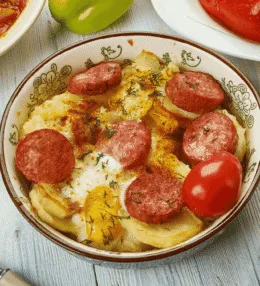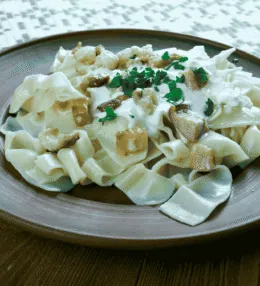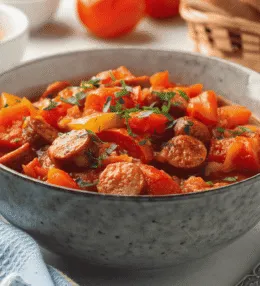
- View
Table of Contents
ToggleDolmades, or stuffed grape leaves, are a Greek culinary classic that brings the essence of the Mediterranean to the table. Known for their delicate yet rich flavour, these small rolls filled with rice, herbs, and sometimes minced meat, are a beloved part of Greek cuisine.
Dolmades are often enjoyed as appetizers or part of a meze platter, inviting everyone to experience the freshness and balance of Greek flavours in each bite.
Want to dive deeper into Greek Cuisine? Don’t miss our post on 39 Traditional Greek Foods to Try
What Are Dolmades?
Dolmades are a traditional Greek dish consisting of grape leaves wrapped around a seasoned filling of rice, fresh herbs, and sometimes a bit of minced meat like lamb or beef. The name comes from the Turkish word dolma, meaning “to stuff,” but the Greek preparation has its own unique touch.
Dolmades are often cooked slowly in olive oil, allowing the flavours to meld together, creating a dish that is both hearty and refreshing. The stuffed leaves can be enjoyed warm or cold, typically accompanied by a squeeze of lemon juice to add brightness and a hint of acidity.
In Greece, dolmades are a mainstay at family gatherings and festive occasions, served as a starter or alongside a spread of meze. The balance of flavours and the soft texture of the grape leaves make them a perfect dish to pair with other Mediterranean delights.
Ingredients and Taste
The ingredients in dolmades are simple yet thoughtfully selected to create a harmonious flavour profile. The grape leaves are often preserved in brine, which brings a subtle saltiness to the dish and contrasts beautifully with the delicate rice filling.
The rice, the heart of the filling, is cooked with fresh herbs like dill, mint, and parsley, adding a fragrant quality that’s key to the dish’s character. Pine nuts or currants are sometimes included for a touch of sweetness and texture, especially in vegetarian versions.
When meat is included, it adds depth to the flavour, creating a richer, more filling dolma. Olive oil is essential, both for cooking and for flavour, it enriches the rice and brings a smooth, slightly fruity taste that enhances every ingredient.
A final squeeze of fresh lemon juice adds a bright note that cuts through the richness, tying all the flavours together. The overall taste of dolmades is a blend of earthy, herbaceous, and slightly tangy notes, with a soft, tender texture that’s incredibly satisfying.
A Taste of History
Dolmades have a storied history in Greek cuisine and beyond, with roots that trace back to ancient times. The practice of stuffing vegetables and leaves with rice or other grains has long been part of Mediterranean and Middle Eastern culinary traditions.
While the exact origin is debated, the dish became a staple throughout the region due to the abundance of grapevines and the versatility of stuffed dishes. Each culture has its own version, but in Greece, dolmades hold a special place, often representing hospitality and the spirit of sharing.
The recipe for dolmades has been passed down through generations, with each family adding its own personal touches, whether it’s a particular blend of herbs or the decision to add pine nuts or meat.
Making dolmades is often a communal activity, with family members gathering to roll and prepare the grape leaves together, a ritual that fosters connection and pride in shared traditions.

Greek Dolmades (Stuffed Grape Leaves)
Ingredients
- 1 jar about 200g grape leaves, rinsed and drained
- 1/2 cup uncooked short-grain rice rinsed
- 1 medium onion finely chopped
- 1/4 cup fresh dill chopped
- 1/4 cup fresh parsley chopped
- 2 tbsp fresh mint chopped
- 1/4 cup pine nuts optional, for added texture and flavour
- Juice of 1 large lemon
- 1/4 cup olive oil plus extra for drizzling
- Salt and black pepper to taste
- 1 1/2 cups vegetable or chicken broth
Instructions
- In a large bowl, combine the rice, chopped onion, dill, parsley, mint, pine nuts (if using), half of the lemon juice, and 2 tablespoons of olive oil. Mix thoroughly to evenly distribute the herbs and seasonings. This fragrant filling will infuse the grape leaves with traditional Mediterranean flavours.
- On a clean work surface, lay a grape leaf with the veined side facing up. Place a small spoonful of the rice mixture near the stem end. Fold the sides over the filling, then roll tightly from the bottom up, creating a small cylindrical shape. Avoid overstuffing, as the rice will expand during cooking.
- Repeat the rolling process with the remaining grape leaves and filling, placing each rolled dolma seam side down on a plate as you go. For best results, ensure each roll is snug but not too tight to prevent tearing.
- In a wide pot or a deep skillet, drizzle a bit of olive oil and arrange a few grape leaves on the bottom (this prevents sticking). Place the rolled dolmades seam-side down in snug, even layers within the pot.
- Once all the dolmades are arranged in the pot, pour the remaining lemon juice and olive oil over them. Add the broth, ensuring the dolmades are just covered with liquid. This will help the rice cook evenly and keep the grape leaves tender.
- Place a heatproof plate on top of the dolmades to prevent them from unrolling during cooking. Cover the pot with a lid and bring the liquid to a gentle simmer over medium heat.
- Reduce the heat to low and let the dolmades simmer for about 40-50 minutes, or until the rice is fully cooked and the grape leaves are tender. If needed, add a bit more broth during cooking to keep them submerged.
- Carefully remove the dolmades from the pot and transfer to a serving plate. Serve warm or at room temperature, drizzled with a bit of extra olive oil and an additional squeeze of lemon juice for brightness. Pair with tzatziki or a side of Greek yogurt for added flavour.
Nutrition
You May Also Like










